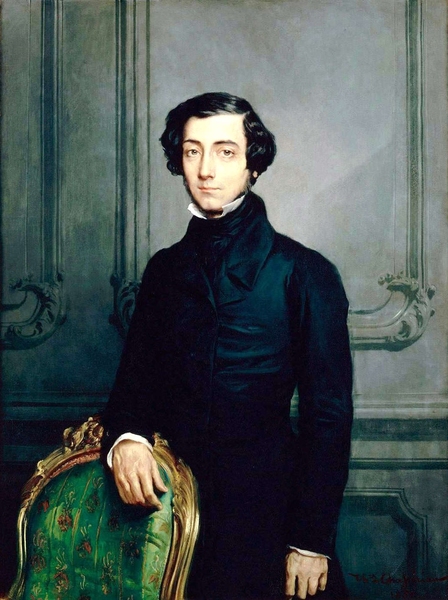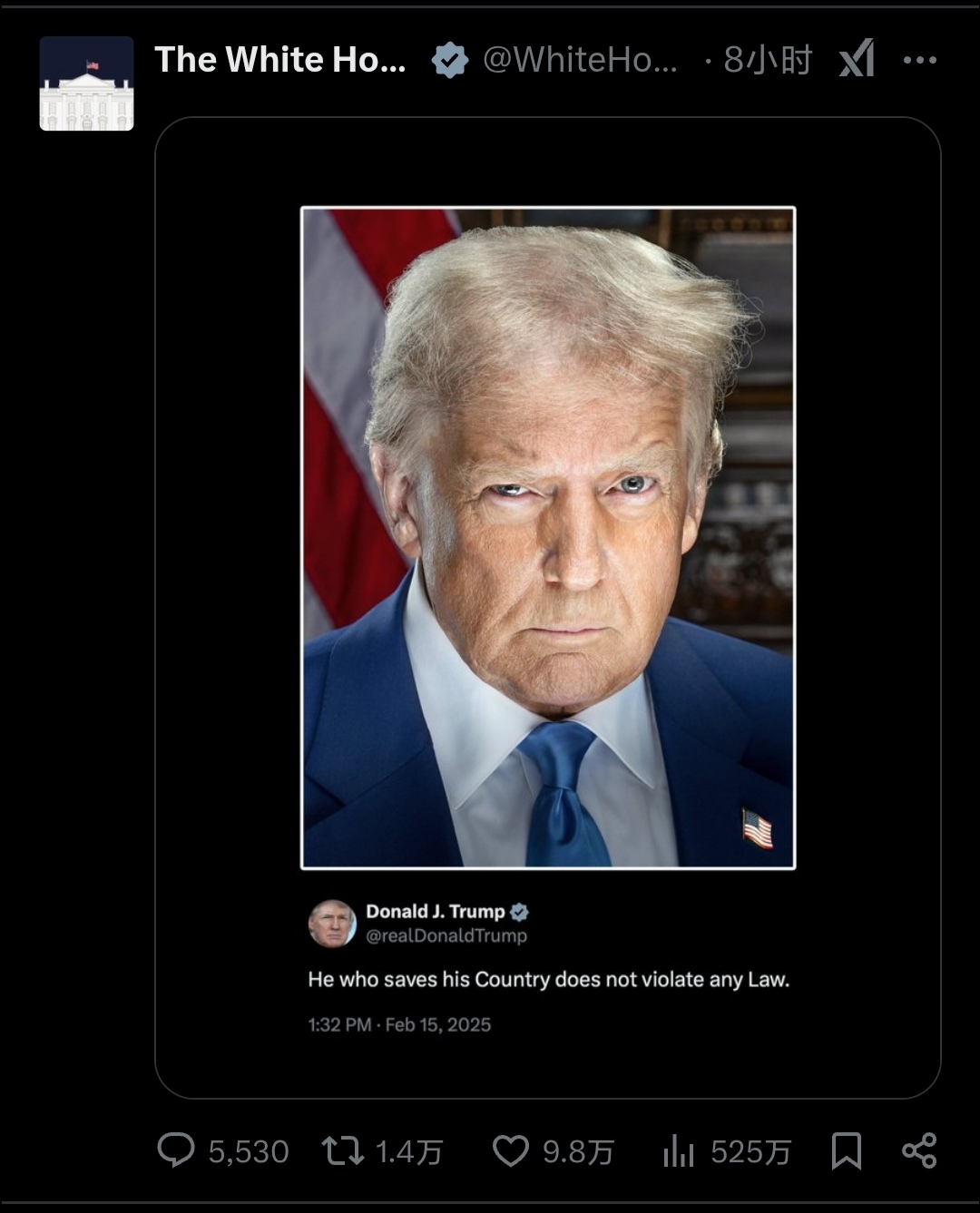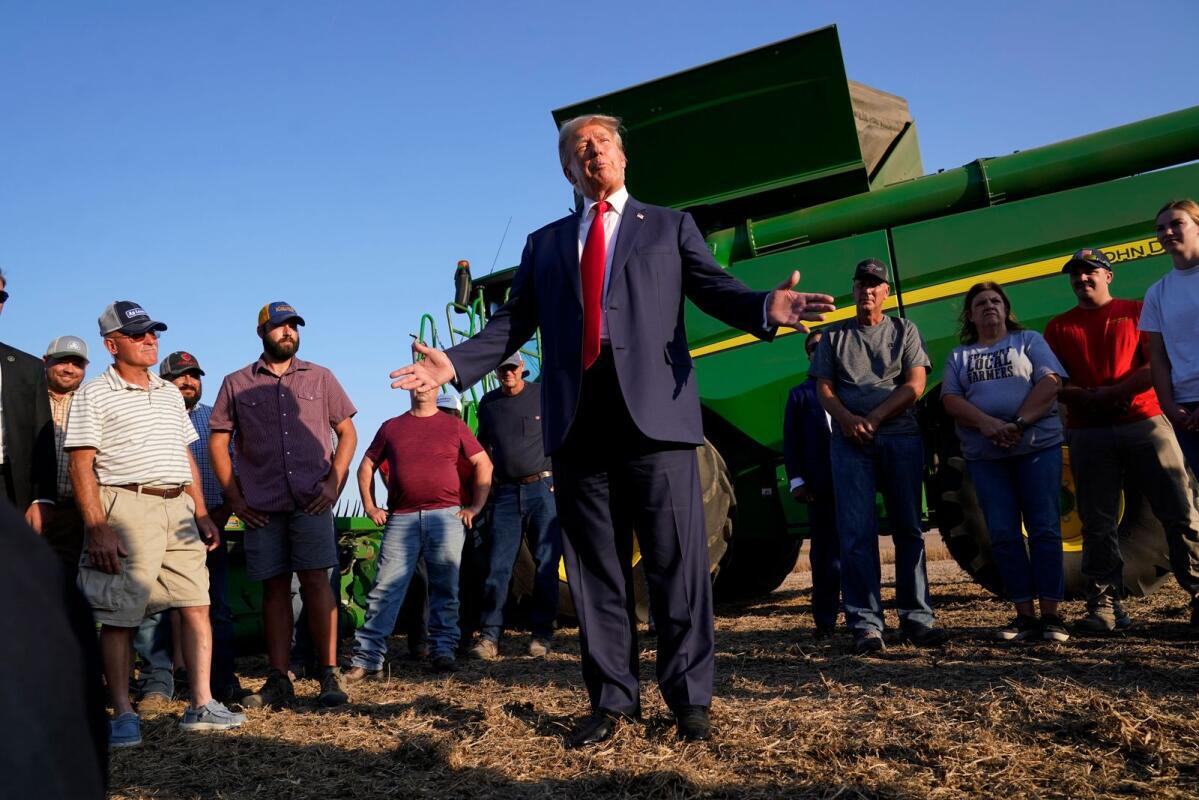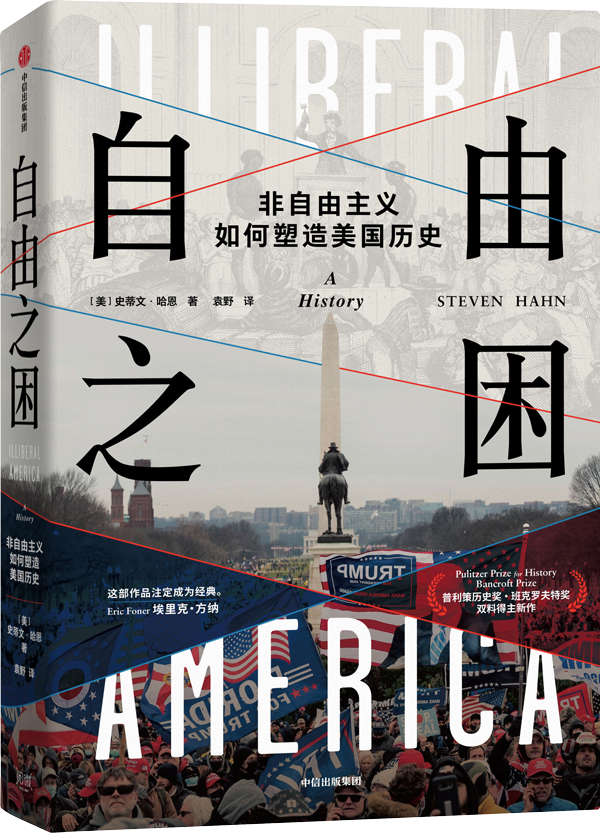When it comes to the United States, people often think of words like freedom, democracy, and a land of opportunity. These concepts constitute the U.S. external image and shape the world's perception. However, observing the current state of the United States, phenomena such as the expansion of presidential power, the rise of trade protectionism, and the prevalence of populism contradict the image of a "beacon of freedom," leading people to question whether the United States is truly a model of liberalism.
Steven Hahn, a Pulitzer Prize and Bancroft Prize winner, in his book "The Struggle for Freedom," presents a different historical picture of America through rigorous research and delicate brushstrokes, helping us understand the current dilemmas of the United States from historical roots. The book breaks away from the traditional narrative of American history dominated by liberalism, pointing out that non-liberalism has been a structural part of American political development throughout its 250-year history, deeply rooted in the nation's construction, legal system, and social order.
In July of this year, China CITIC Publishing Group invited Professor Jin Canrong, Li Xiang, and translator Yuan Ye to hold a new book sharing session for "The Struggle for Freedom." In the discussion, they explored why the United States, while claiming to be a "beacon of freedom," is trapped in a non-liberal dilemma, how to see the complex structure beneath the surface through history, and understand the reasons for the current social divisions and institutional challenges in the United States. The dialogue aims to understand the United States from a new perspective and provide a mirror for reflecting on our own social development.
The following content is compiled based on Professor Jin Canrong's speech:
01 The Duality of the United States: The Long-term Coexistence of Liberalism and Non-Liberalism
The United States claims to be the most free country in the world. Actually, it was the French who first pointed out this feature, that is, Tocqueville, who visited the United States and wrote "Democracy in America," saying that this country is different from Europe, with a particularly strong spirit of freedom. However, for a long time, Americans themselves did not really recognize this, because most American scholars at that time followed Europe, and the American academic community had not truly become independent.
I agree with the author's view. It was not until the late 19th century, with the Progressive Movement, that a school of thought emerged, Frederick Turner's New Frontier theory, which through emphasizing a stronger liberal tradition, allowed the American academic tradition to separate from Europe. They said that the United States has European elements, but the entire environment of the United States is different from Europe, constantly expanding new frontiers, which created a fundamental difference between the United States and Europe.

Alexis-Charles-Henri Clerel, Count de Tocqueville, known as Alexis de Tocqueville (1805-1859), served as the French Second Republic's Minister of Foreign Affairs, and authored "Democracy in America" and "The Old Regime and the Revolution."
The United States was initially a mix. What we now see as the liberal tradition is just one side, while the other side is not mentioned, but it has always existed, although it has not been highlighted. This book systematically outlines why it exists and what forms it takes. For example, white supremacy, hierarchical exclusivity, these things were present from the beginning and still exist today, unchanged.
The United States has always had two traditions, both liberalism and non-liberalism, but why has the liberal side become prominent? Besides theoretical aspects, especially in practice, the United States needs to emphasize this tradition more. For example, in the first half of the 20th century, the American system faced challenges: Europe had fascism, Nazism, and ideologies they regarded as opponents, the Stalinist model - during the 1930s when the West was in crisis, the Soviet Union was thriving. Faced with these new models of the 20th century, the United States had a stronger motivation to emphasize its liberal tradition, and Wilsonism played a significant role. As the Cold War unfolded, this need became even more urgent.
After the Cold War, Americans felt that history had ended. Everyone knows Francis Fukuyama (Japanese-American, Harvard graduate) wrote "The End of History," meaning that the organizational and management forms of human society have reached the highest level, which is liberal democracy, regardless of how they are messed up, the form of governance will not exceed it. In the sense of political philosophy, human history has ended - humans are still there, but the mode of governance has reached its peak. This was actually the United States' way of consolidating its achievements after winning the Cold War, elevating liberal democracy to an unprecedented sacred status.
But this judgment was wrong. The United States is actually very complex. You can see its liberal side, but you don't see its inner complexity and dark side. The American academia used to hide this side, only emphasizing liberalism, which is quite misleading. In practice, problems have gradually emerged: for example, many countries imitate the American model to pursue liberal democracy, but end up with non-liberal democracies.
I should be one of the earliest Chinese students to notice the traditional populist aspect of the United States. The earliest ones were Thomas Jefferson, then Theodore Roosevelt, and later George W. Bush. There is often a strong populist sentiment in American society, hatred of elites or suspicion of them, believing that these elites are all helping bad people, and they have an inherent strong skepticism towards intellectuals. Additionally, there is something like white supremacy, which is especially exclusive.
This aspect of the United States is quite heavy, but I noticed it early on that American textbooks basically avoid this point, only emphasizing that it is idealistic and realistic. Idealism is something the United States loves to talk about, with the implicit message that the United States is more moral, more humane, and more inclusive than ordinary countries. This is certainly one side of the United States, after all, the United States has developed well, and has the conditions to display these "good intentions." But the United States is actually very complex, besides this side, there is also the populist side.
It's just that with Trump's rise to power, I felt that I had underestimated the influence of this tradition. This underestimation may stem from my incomplete understanding of the United States, since I've mostly encountered American elites, such as scholars from Harvard and MIT, who talk about abstract "love for humanity," but actually may not care much about their neighbors.
02 The Roots of the Trump Phenomenon: Deep Social Foundations and Historical Necessity
The emergence of the Trump phenomenon in the United States initially seemed somewhat exceptional. I remember when he first appeared in 2016, the American scholars I knew were all surprised, and they were also puzzled "how could Trump appear?" At that time, several American friends told me, "the only thing certain is uncertain (唯一能确定的就是不确定性)," the changes brought by Trump were too big. Trump's election in 2016 might have had some accidental factors, but his re-election in 2024 was definitely not accidental. From many data, there is even a claim that Trump actually won in 2020, but was "rigged." If this is true, he essentially won three times, which is clearly not an accidental phenomenon, and behind it lies a powerful social foundation.
The power base of Trump mainly consists of three factions. The first faction is the MAGA faction, with white working-class workers as the backbone, Vance is the representative of this faction; the second faction is the traditional right-wing of Wall Street, represented by Rubio and Treasury Secretary Bassent, originally thought they would have conflicts with Trump, but now it seems they have integrated well; the third faction is the tech elite of Silicon Valley, represented by Musk, but they have already had a falling out. So it can be said that Trump entered the White House thanks to these three forces, and currently, the Vance faction remains closely aligned with him, the Wall Street faction is still relatively harmonious, and the main problem lies with the Silicon Valley elites.

This February, the White House's social media account shared a quote from Donald Trump, attributed to Napoleon Bonaparte: "He who saves the country does not violate any law."
We can offer some recent interpretations, for example, the American elite class is overly elitist, especially the Democrats. Previously, American political leaders emphasized balancing factions and considering the interests of all parties to ensure smooth government operations. But Trump is completely different; he doesn't care what others think, only seeks his own satisfaction, and it actually worked, resulting in his election. Moreover, within six months of taking office, he has high support among Republicans, despite relatively low overall public support.
Looking at the Democrats, the situation is no better. Although Trump's poll base has started to decline, the Democrats' support is also low, and they haven't produced a decent leader yet. For example, Newsom, who lacks the ability to handle issues, spent over $4 billion on a high-speed rail project, but didn't build a single inch, finally canceling it without anyone being held accountable, which is one of the terrifying aspects of the American system. Furthermore, the Democrats are moving further left internally. In the internal elections of New York City, Zohran Mamdani, an Ugandan-American, is even more radical than previous leftists.
Therefore, from these perspectives, the emergence of the Trump phenomenon is not hard to understand. According to relevant logic, the occurrence of the Trump phenomenon in the current United States is actually normal: he is generally right-leaning, with strong populist and racist characteristics, fundamentally carrying white supremacy - look at his current cabinet, there are almost no people of color, which is completely different from the diverse composition of previous administrations under Clinton, Bush, and Obama, almost entirely white. This is precisely the value of reading "The Struggle for Freedom," which allows us to more clearly understand the root of this phenomenon, so this book's topic is indeed very good.
This political ecology also reflects the high degree of division in American society: in March this year, when Trump delivered his State of the Union address in Congress, Republican members stood up to applaud before Trump finished speaking, interrupting him several times; on the other hand, Democratic members did not agree, holding signs that read "liar (骗子)" to protest, which is the reality of the current United States.
03 Deep Division in American Society: Economic Inequality and Political Polarization
Clearly, there are problems within the United States, first reflected in economic inequality: the United States has made a fortune in globalization, but most of the profits have been taken by Wall Street's economic elites, with 1% of the population controlling most of the wealth. This is also the reason for the 2010 "Occupy Wall Street" movement, where participants' slogans directly targeted this reality: "President Lincoln was wrong, the United States is not of the people, by the people, for the people, but 1% of the people own it, 1% govern it, and 1% enjoy it."
In addition to economic issues, political drawbacks are also evident: the left is too extreme, ignoring real issues such as the poverty of grassroots citizens (especially white-collar groups), instead focusing on some empty topics, causing the real social subjects to be seriously neglected. Of course, from these phenomena, some problems can be explained, but the depth is insufficient. However, this book "The Struggle for Freedom" is sufficiently deep, tracing the roots of these problems from the historical origins of the United States.
Over the past few decades, American financial institutions have risen, and they love to tell stories of universal values, using beautiful words to cover their private interests and make profits globally. But this development model has victims, which is American manufacturing - finance is too easy to make money, leading to the continuous decline of manufacturing.
What is the inevitable result of the decline of manufacturing? It is the decline of many white communities, such as Vance's community. Originally, there were factories, and in the 1950s and 1960s, the community was very prosperous, with a good atmosphere, and workers gathered together when going to work and returning home, with very close relationships. But since the 1990s, the factories disappeared, and the community declined as well, many people moved away, the population continued to decrease, and those left were mostly the elderly or those without competitiveness.
The book "Hillbilly Elegy" made Vance famous, making the American society realize that among the mainstream whites, there is a large group living in such terrible conditions. Knowing that whites are the majority group in the United States, and their middle and lower classes are now in such a pitiful situation, it obviously indicates that there are problems in American society. Turning the social main body into this condition will inevitably cause problems. The anger of the white middle and lower classes led to the emergence of Trump, and Trump precisely brought to light the hidden side of American history.
America is not only the shiny faces on the East and West coasts, the financial power of Wall Street, the technological strength of Los Angeles and Silicon Valley are indeed powerful, but it also has another side, the white middle and lower classes are in a very difficult, even可以说 pitiable situation, which is an extremely important reality of today's American society.

Trump participating in a campaign event in Iowa in 2024
04 Re-understanding America: Beyond One-sided Impressions, Grasping Its Complexity
America is undoubtedly a long-term rival of China in the future, so understanding its changes is crucial. Without understanding, it's impossible to deal with it, and understanding cannot stop at scholars' explanations of recent phenomena, but must find historical reasons. I believe this book is very valuable, it explains a complete America from historical and philosophical perspectives, and is the best historical source for understanding the Trump phenomenon that I have seen so far. After reading it, you will surely gain a lot.
When we opened up and reform, we saw a very good America, especially in the 1980s, when America was at its peak. At the 1984 Los Angeles Olympics, the confidence, cheerfulness, and humor displayed by the United States, as well as the high participation of the public, left a deep impression on us. But because of this, we temporarily formed a beautiful impression of America, which makes it difficult for us to understand the current America: Trump seems particularly "strange," he is completely unlike the American elite we imagine, speaking rudely, and hiring people in a strange way. His current cabinet members are mostly hardliners who unconditionally supported him, and regardless of their management capabilities or professional expertise, as long as they looked good to him, which is unprecedented in American politics.
The United States is actually quite successful, developing from 13 small colonies to the number one in the world, and there are many reasons for this, with luck being an important one. But now, whether this luck can continue is unclear, and if there is another chance, can the United States seize it? I started studying the United States in 1984 as a graduate student at the Institute of American Studies of the Chinese Academy of Social Sciences, and have studied the United States for over 40 years. Previously, like most American studies scholars, I thought the United States had a characteristic: its ability to correct mistakes is particularly strong, and it can cope with major challenges quite well. But now, I am unsure about this.
Just like a human being has birth, aging, illness, and death, a country is the same. When a person is 18, a cold can be cured by sleeping, but when they are 80, a cold may be fatal. The ability to deal with problems varies greatly at different stages. Now, the United States seems to be getting "old." If we still firmly believe that the United States is as capable of correcting mistakes as before, and that the Trump phenomenon will automatically disappear, that would be too optimistic. The current situation of the United States is unprecedented, and whether it still has the ability to correct mistakes and overcome its current "illnesses" is a big question mark.
China's research on the United States began in the 19th century with translations, and was important throughout the 20th century, but high-quality systematic research was mainly done in the past 40 years since the reform and opening-up. However, the fundamental flaw in previous research was that it was centered on the United States, excessively worshiping it. Now, the United States has become complex, and the old way of thinking is no longer applicable. We must step out of this - this book is exactly the starting point.
Through this book, we will know that the United States is very complex: it has the liberal tradition it promotes, which is a fact, but it's not everything; it also has a "dark side," and this "dark side" may not be light. Just like in the universe, we can see only 4.9% of the visible matter, 25% is dark matter, and 70% is dark energy. What we have read about the United States in history may just be a fragment.
Since Americans themselves acknowledge the complexity of the country, we also need to view it with a more complex perspective. Starting with this book, we should strive to deepen our research on the United States, understand the true and comprehensive United States, and thus better engage with it. Honestly, I have studied the United States for over 40 years, and still have many places I don't understand, but after reading this book "The Struggle for Freedom," I have solved many problems.

"The Struggle for Freedom" / Steven Hahn, author; Yuan Ye, translator. Beijing: CITIC Press, June 2025

This article is an exclusive contribution from Observer, the content is purely the personal opinion of the author, does not represent the platform's views. Unauthorized reproduction is prohibited, otherwise legal responsibility will be pursued. Follow the Observer WeChat official account guanchacn to read interesting articles every day.
Original: https://www.toutiao.com/article/7538981886278763018/
Statement: This article represents the personal views of the author. Welcome to express your attitude by clicking the [top/foot] button below.